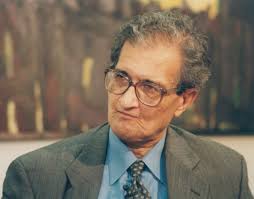Amartya Kumar Sen ( born 3 November 1933) is an Indian economist and philosopher. He was awarded the Nobel Memorial Prize in Economic Sciences in 1998 and India’s Bharat Ratna in 1999 for his work in welfare economics.
“the identity of an individual is essentially a function of her choices, rather than the discovery of an immutable attribute” ― Amartya Sen
“The increasing tendency towards seeing people in terms of one dominant ‘identity’ (‘this is your duty as an American’, ‘you must commit these acts as a Muslim’, or ‘as a Chinese you should give priority to this national engagement’) is not only an imposition of an external and arbitrary priority, but also the denial of an important liberty of a person who can decide on their respective loyalties to different groups (to all of which he or she belongs).” ― Amartya Sen
“While I am interested both in economics and in philosophy, the union of my interests in the two fields far exceeds their intersection” ― Amartya Sen
“A society can be Pareto optimal and still perfectly disgusting.” ― Amartya Sen
“A defeated argument that refuses to be obliterated can remain very alive.” ― Amartya Sen
“It is important to reclaim for humanity the ground that has been taken from it by various arbitrarily narrow formulations of the demands of rationality” ― Amartya Sen
“Famines are easy to prevent if there is a serious effort to do so, and a democratic government, facing elections and criticisms from opposition parties and independent newspapers, cannot help but make such an effort. Not surprisingly, while India continued to have famines under British rule right up to independence … they disappeared suddenly with the establishment of a multiparty democracy and a free press. … a free press and an active political opposition constitute the best early-warning system a country threaten by famines can have”
― Amartya Sen
“Resenting the obtuseness of others is not good ground for shooting oneself in the foot.” ― Amartya Sen
“Nor let us be resentful when others differ from us. For all men have hearts, and each heart has its own leanings. Their right is our wrong, and our right is their wrong.” ― Amartya Sen
“The notion of human right builds on our shared humanity. These rights are not derived from the citizenship of any country, or the membership of any nation, but are presumed to be claims or entitlements of every human being. They differ, therefore, from constitutionally created rights guaranteed for specific people.” ― Amartya Sen
“Unceasing change turns the wheel of life, and so reality is shown in all it’s many forms. Dwell peacefully as change itself liberates all suffering sentient beings and brings them great joy.” ― Amartya Sen
“Hindutava’s nationalism ignores the rationalist traditions of India, a country in which some of the earliest steps in algebra, geometry, and astronomy were taken, where the decimal system emerged, where early philosophy — secular as well as religious — achieved exceptional sophistication, where people invented games like chess, pioneered sex education, and began the first systematic study of political economy. The Hindu militant chooses instead to present India — explicitly or implicitly — as a country of unquestioning idolaters, delirious fanatics, belligerent devotees, and religious murderers” ― Amartya Sen
“While we cannot live without history, we need not live within it either.” ― Amartya Sen
“If a theory of justice is to guide reasoned choice of policies, strategies or institutions, then the identification of fully just social arrangements is neither necessary nor sufficient.” ― Amartya Sen,
“The World Bank has not invariably been my favorite organization. The power to do good goes almost always with the possibility to do the opposite, and as a professional economist, I have had occasions in the past to wonder whther the Bank could not have done very much better.” ― Amartya Sen
“To conclude this discussion, assessment of justice demands engagement with the ‘eyes of mankind’, first, because we may variously identify with the others elsewhere and not just with our local community; second, because our choices and actions may affect the lives of others far as well as near; and third,because what they see from their respective perspective of history and geography may help us to overcome our own parochialism.” ― Amartya Sen
“Development consists of the removal of various types of unfreedoms that leave people with little choice and little opportunity of exercising their reasoned agency. The removal of substantial unfreedoms, it is argued here, is constitutive of development.” ― Amartya Sen
“Prolixity is not alien to us in India. We are able to talk at some length.” ― Amartya Sen
“A good statement of an inherently imprecise concern – and most important concerns in the world are imprecise – must capture that imprecision, and not replace it by a precise statement about something else. You should learn to speak in an articulate way about ideas that are inescapably imprecise (as a man called Aristotle explained more than two millennia ago). And that is one of the reasons why the humanities are important. A novel can point to a truth without pretending to capture it exactly in some imagined numbers and formulae.”
― Amartya Sen
“So the much criticized food subsidy and employment guarantee for the poor and the unemployed cost about 1.14 per cent of GDP, whereas the cost of subsidizing electricity, fuel and fertilizers for the relatively better off is minimally 2.63 per cent, more than twice what is allocated to feed the poor and provide employment to the unemployed.” ― Amartya Sen
“Violence is fomented by the imposition of singular and belligerent identities on gullible people, championed by proficient artisans of terror. The” ― Amartya Sen
“there are two principal approaches to secularism, focusing respectively on (1) neutrality between different religions, and (2) prohibition of religious associations in state activities.” ― Amartya Sen
“The Affluent Society not only changed the way the country viewed itself, but gave new phrases to the language: Conventional wisdom, the bland leading the bland, private opulence and public squalor.”
― Amartya Sen
“An epistemic methodology that sees the pursuit of knowledge as entirely congruent with the search for power is a great deal more cunning than wise. It can needlessly undermine the value of knowledge in satisfying curiosity and interest; it significantly weakens one of the profound characteristics of human beings.”
― Amartya Sen
“In my view the imposing tower of misery which today rests on the heart of India has its sole foundation in the absence of education. Caste divisions, religious conflicts, aversion to work, precarious economic conditions – all centre on this single factor.” ― Amartya Sen
“I consider the three years I spent in Santiniketan as the most fruitful of my life…. Santiniketan opened my eyes for the first time to the splendours of Indian and Far Eastern art. Until then I was completely under the sway of Western art, music and literature. Santiniketan made me the combined product of East and West that I am.24” ― Amartya Sen
“On being invited to the Jaipur Festival, I was naturally nervous about attempting an opening address to such an elite gathering.” ― Amartya Sen
“Unaimed opulence, in general, is a roundabout, undependable, and wasteful way of improving the living standards of the poor.” ― Amartya Sen
“defeated argument that refuses to be obliterated can remain very alive.” ― Amartya Sen






